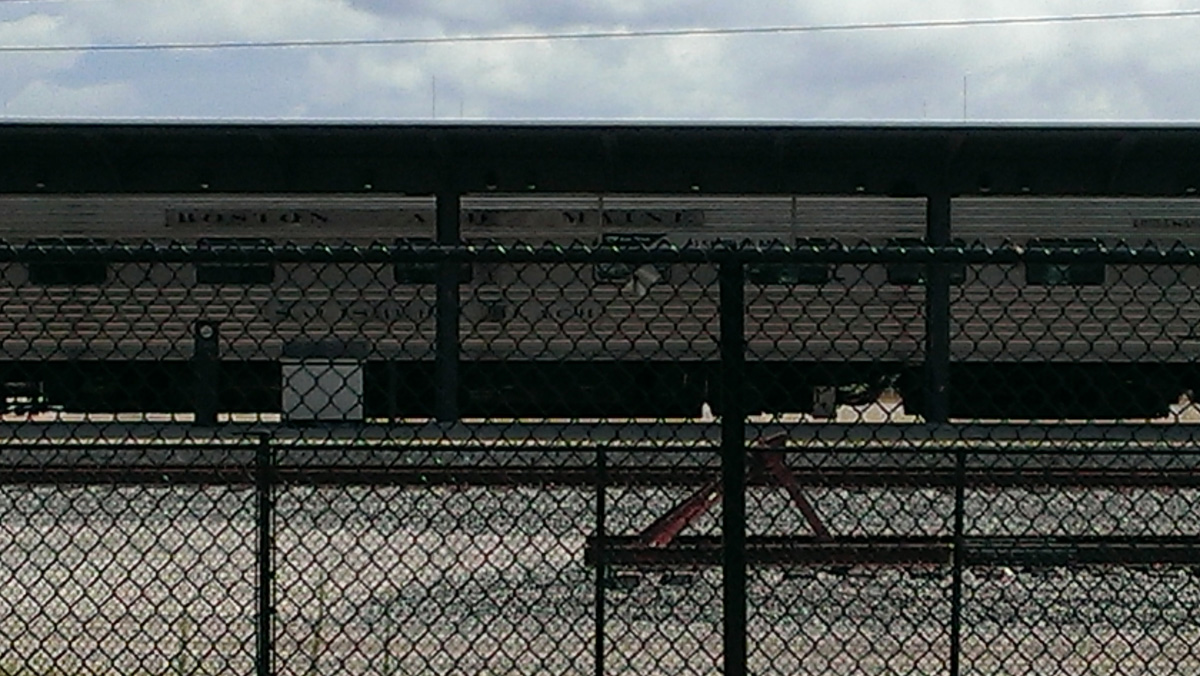
As with most things of passing interest at St. Paul’s Union Depot, this old train was a mystery locked behind the impenetrable fortress of the Amtrak gate. Anyone interested in it couldn’t get near it.
Why would a many-decades-old Pullman car be sitting on the siding? The “Salisbury Beach” is a 60-year-old car that was built for the Boston and Maine Railroad for service between Concord, New Hampshire and New York City on the “State of Maine Express.”
Ironically, it’s on a high-tech mission, it turns out.
The Millennial Trains Project is riding from Portland, Oregon, to New York as a nonprofit conference on the rails with 24 young entrepreneurs, who raised the money through crowdsourcing.
Sunday afternoon assembly about innovation aboard @MillennialTrain somewhere between Kremlin and Havre, Montana. pic.twitter.com/TOXqTe2Laq
— David L. Bragdon (@ZephyrBrag) August 10, 2014
If they raised the money — about $5,000 — and convinced the organizers that their innovation plan was legit, they got the trip.
According to the group’s website:
The inspiration for the Millennial Trains Project comes from a similar train journey (the Jagriti Yatra) that MTP founder Patrick Dowd helped lead as a 2010-11 Fulbright Scholar in India.
Returning stateside, Patrick (Dowd) went to work as an investment-banking analyst in New York just as the Occupy Wall Street movement was beginning to gather steam.
As the protests grew, he was reminded of how differently he had observed Millennials coming together around the Jagriti Yatra in India, and felt that a similar initiative in the United States could provide a more positive model for channeling dissatisfaction with the way things were.
Inspired to bring this idea to life, he quit his job and set out to begin building what would become the Millennial Trains Project.
In the year that followed, the vision for MTP evolved and gained momentum as talented team members, advisors, and coalition partners stepped forward to contribute their time, passion, and financial resources to the project.
In August 2013, MTP led its first transcontinental train journey from San Francisco, CA to Washington, D.C. Through ten days of shared discovery, individual exploration and imaginative discourse across seven U.S. cities, the Millennial Trains Project and its inaugural class of pioneering participants have established trains as a powerful platform for young people who aspire to shape the future.
According to the website, one participant is using geometric patterns to convince communities to live healthier lives, another wants to use abandoned industrial spaces in cities for performance space, and another hopes to use the trip to evaluate whether kids are ready for college.
One young woman met with people at a local Red Cross today. She’s developing a project on disaster preparedness. Another is convening a panel of Twin Cities residents to talk about racial healing.
Here’s the entire list of participants.
Five of those aboard are Fulbright Scholars from Russia, Pakistan, Yemen, Colombia, and Indonesia.
When the train is rolling, they have seminars and presentations. When it stops in a city, the participants explore, meet with innovators, and test out or research their ideas.
“The train nicely balances pragmatism with idealism,” Dowd told me this afternoon. “Trains are perfect for it. It’s very conducive to fostering dialogue on our trips. On the inside we have a ‘maker space’ with all sorts of 3-D printers and scanners.”
The train will hitch a ride with tomorrow’s eastbound Empire Builder and the group will stop in Milwaukee next, make it to New York in a week, and then visit with some officials at the White House.
